
The Economic System God Ordained for Mankind
God’s System Compared to Man’s System
The subject of economics is a complex and difficult one, that has developed into a science in modern times. Some have even called it the “dismal science,” because of its imprecise nature firmly ensconced within human nature and its unpredictability and cussedness. It really cannot be classified as a science at all, science being the investigations into the nature and truths of the creation. The economy of individuals, families, communities, and nations is more about the nuances of behavior rather than the realities of our created world.
Let us first define economics. According to the dictionary,1 it is …
(1) a social science concerned chiefly with the description and analysis of the production, distribution, and consumption of goods and services
(2) economic theory, principles, and practices
For the purposes of this discussion I am going to simply refer to economics as the “production, distribution, and consumption of goods and services for a people or nation.” Pseudo-science will enter the picture with modern age considerations, but then only as we see governments attempting to regulate this production, distribution, and consumption toward their own ends.
The Three Economic Systems of Man
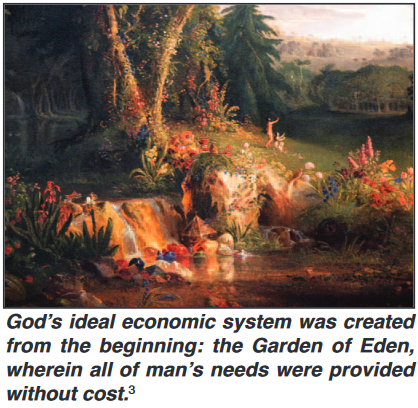 Over the last 6,000 years, economists generally agree that there have been three major systems of economy that have developed across the world. All three of these rely on social rewards or penalities of one type or another.
Over the last 6,000 years, economists generally agree that there have been three major systems of economy that have developed across the world. All three of these rely on social rewards or penalities of one type or another.
1. Traditional systems. These systems are based on customs, history, and time-honored beliefs which shape the goods and services that the economy produces and distributes. Countries that utilize this system are rural and farm-based, and are often termed subsistent or family self-sufficient. Many of the goods produced are used by the individuals and families that produce them, and any surplus is bartered or traded with neighbors and friends. Sometimes surplus goods are given to a ruler or land owner.There are few traditional economies in the world today because so many farmers have been forced to move to cities, where a command or market system predominates. Even farms in most countries, which were initially traditional in their early stages, have become a part of the command system in Communist countries, or of the market system in many Western countries.
Examples of this type of economy exist today in tea plantations in South India, within the Inuit society in Canada, and in some tribes of New Guinea and the Amazon.. These societies have tools that many call out dated — animal power pulling plows and cultivators, hoes, and much hand labor — and are sometimes termed primitive or underdeveloped. However, many scholars in economics and anthropology do not agree with the primitiveness of these cultures, pointing out their strong sustainability and emphasis on family itegrity and satisfaction with their lives.2
4As I stated in my book Millennial Agriculture,
“There appears to be a law of nature that as most of society tends to move further and further away from a pastoral life towards a highly sophisticated, machine-oriented, gadget-ridden type of life, the amount of truly free, unencumbered time that individuals possess becomes proportionately reduced. Many rural citizens of less developed countries such as Indonesia and Ecuador, while often not prosperous by modern Western standards, yet provide well for their physical sustenance while enjoying ample time for family and community activities.”E.F. Schumacher in Small is Beautiful: Economics As If People Mattered, reiterated this law of economics:
“The amount of real leisure a society enjoys tends to be in inverse proportion to the amount of labour-saving machinery it employs.”5
6 2. Command systems. These economic systems existed during the twentieth century within the Soviet Union and Communist China, where the state machine controlled the means of production and distribution of goods and services. In this system the means of production are publicly owned, and economic activity is controlled by a central authority that assigns quantitative production goals and allots raw materials to enterprises. In such systems, determining the proportion of total product used for investment rather than consumption becomes a centralized political decision. After this decision is made, then the central planners decide which goods are to be produced, and the quotas that are to be achieved.The central planners’ decisions can be influenced by surpluses or shortfalls in production as consumers choose to purchase various products, but the central authorities make production decisions. Supply and demand do not function freely as in a free market system.
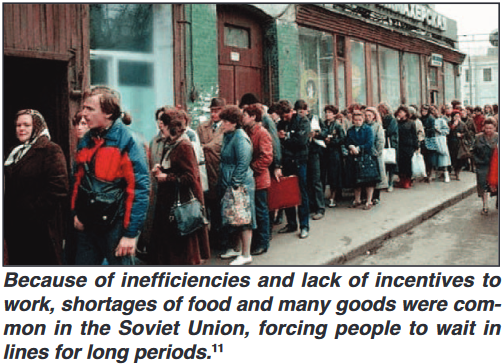 Prices are set by the central planners, but these prices do not serve as signals to producers of goods to increase or decrease production, like in a market economy. Rather, prices are used to adjust demand for the goods with the available supply, besides allowing for revenues to the state government.7
Prices are set by the central planners, but these prices do not serve as signals to producers of goods to increase or decrease production, like in a market economy. Rather, prices are used to adjust demand for the goods with the available supply, besides allowing for revenues to the state government.7
8The major advantage for the state of a command economy is to mobilize resources quickly during wartime or some other national emergency. However, this type of economy is notoriously inefficient in supplying the needs of the people, as evidenced by the long bread lines in Russia during the years of Marxist rule in Russia and in satellite nations.9 Moreover, the consideration of human factors in the production process is largely removed by government authorities taking to themselves decisions concerning types of products, prices, and production quantities. The desires and needs of individual consumers are suppressed, often leading to shortages of essential goods and widespread discontent among the populace.
As a result of these shortcomings, the Soviet Union was forced to “collapse,” as it were, in 1991 and adopt several market system qualities in order to survive.10I personally experienced the brutal heel of Soviet command economy Marxism in Russia and Ukraine in the 1980s while consulting with an agricultural firm that was attempting to improve crop production on collective farms and in greenhouses. The lack of work incentives was profoundly evident: people simply had no impetus to exert their efforts — physically or intellectually — in working the state-owned fields and orchards. Besides, the central planners giving orders to the farms were vastly out of touch with what was happening on the farms so could not give good advice. One example of this discontent I recall was the command of off-site managers, one dewy morning at harvest time, to move ahead and begin combining a wheat field. It was obvious to the farm workers that the combines would quickly plug with the damp stems, but the workers had no choice. The command was given, and to no one’s surprise the machines quickly plugged, requiring considerable time and effort to unplug the combines.12
 To further illustrate the unworkability of the command system, farmers and town folks in Russia, Ukraine, and other Soviet-dominated counties would give considerable time and attention to their own gardens and orchards. They had great incentives to survive! In 1966, the private sector of the Soviet Union produced 55,800,000 tons of potatoes, or 64% the USSR’s total potato output. Similarly, 43% of vegetables, 40% of meat, 39% of milk, and 66% of eggs were produced by the USSR’s private sector in their garden plots.13
To further illustrate the unworkability of the command system, farmers and town folks in Russia, Ukraine, and other Soviet-dominated counties would give considerable time and attention to their own gardens and orchards. They had great incentives to survive! In 1966, the private sector of the Soviet Union produced 55,800,000 tons of potatoes, or 64% the USSR’s total potato output. Similarly, 43% of vegetables, 40% of meat, 39% of milk, and 66% of eggs were produced by the USSR’s private sector in their garden plots.13
As a result of these realities — that command economy Communism cannot support the needs of a people — the pure command form of economy has almost totally passed from the scene, replaced by a hybrid command-market system while maintaining one-party rule. The one exception is North Korea, where a command economy still reigns supreme, along with periodic food shortages. Command societies of the past, however, have produced some quite remarkable achievements, such as the Great Wall of China and the pyramids of Egypt.
3. Market system. This common system within Western nations utilizes pressures and incentives on production and consumption that are not controlled by a person or committee, as in the common system. Rather, pressures and incentives emerge from the “workings” of the system itself, which are the efforts of individuals to gain financial rewards by supplying the things that others are willing to pay for.
In contrast to the conformity to customs that guides a traditional system, or obedience to superiors that guides a command system, the behavior of people in a market society is mostly self-directed. Such a system might not seem to achieve integration in the social structure, but, as Adam Smith and others since him have pointed out, the “… clash of self-directed wills in the competitive market environment serves as an essential legal and social precondition for the market system to operate.”14
Thus, this competition among self-seeking individuals produces a society in which is embedded an electrifying charge to economic life by unleashing competitive, gain-oriented energies. This sort of motivation is hardly a Godly form of love, joy, serving, and patience as embodied by the spirt of God (Galatians 5:22), but rather it is a motivation based upon getting ahead of someone else, pushing him down to lift yourself above him in your own eyes, and in the view of others around you. It is an inducement to excel based upon the hierarchy of authority in the Luciferian order of command, and far afield from the Eternal’s mind: “And if you call on the Father who without partiality judges according to each one’s work …” (I Peter 1:17); “… in lowliness of mind let each esteem others better than himself: (Philippians 2:3).
As one philosopher friend of mine put it:
“The success of capitalism [the current market economy] is built on the incentive of greed. The failure of capitalism is caused by the greediest of the greedy when the greediest control all the capital and enslave the greedy.”15
Indeed, certain multinational investment enterprises have played the market system to acquire incredible wealth for themselves, a feat possible only through a banking and money system as we have today. By acquiring control of various large companies for decades — Blackrock, Vanguard Group, Charles Schwab, USB Group, etc. — have been making intensive, unlimited use of this free-market capitalistic paradigm to an extreme For instance, Blackrock, Inc., claims $9.42 trillion in assets it manages, with offices in 30 countries.16 This company alone is the largest investment company in the world, and accounts for about 22% of all investible assets managed among the top 10 largest investment companies in 2022.17 The company has controlling interest in companies like Amazon, Walmart, Uber, Pfizer, Boeing, Merck, DuPont, Exxon, Verizon, CNN, Fox News, Honeywell, and Ford, to name a few.
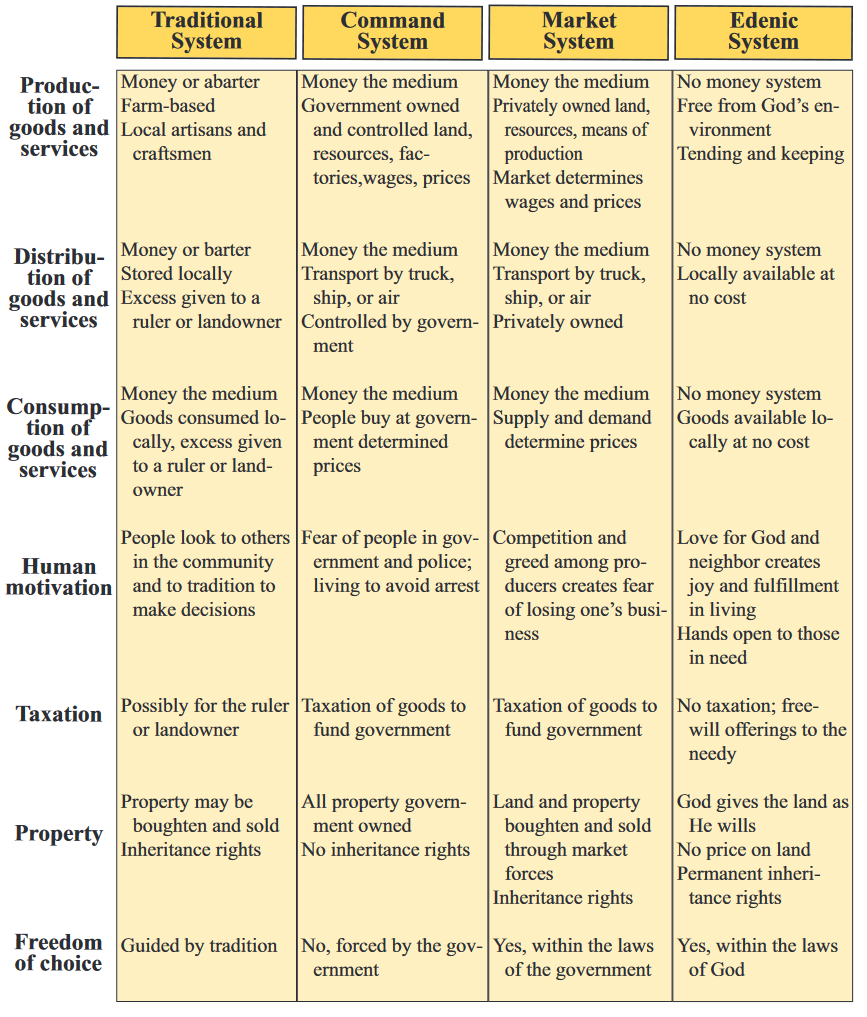
The unhinged pride and egotism of Larry Fink, the CEO of Blackrock, and his desire to control the behavior of others, is summed up in this statement during a New York Times interview:
“You have to force behaviors. If you don’t force behaviors, whether its gender or race or just any way you want to say the composition of your team, you’re going to be impacted. That’s not just recruiting, it’s development. We’re gonna have to force change.”18
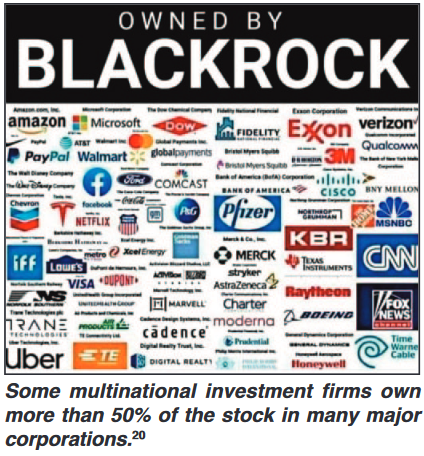 This attitude illustrates the fact that the accumulation of monetary wealth, which knows no limits, cannot satisfy the human spirit. It is power and control over others that becomes the motivating force with these individuals. Yet, as Jesus Christ stated so bluntly in Mark 8:36, “For what will it profit a man if he gains the whole world, and loses his own soul?”
This attitude illustrates the fact that the accumulation of monetary wealth, which knows no limits, cannot satisfy the human spirit. It is power and control over others that becomes the motivating force with these individuals. Yet, as Jesus Christ stated so bluntly in Mark 8:36, “For what will it profit a man if he gains the whole world, and loses his own soul?”
With power that money has in our modern-day world, these players in the market economy who have been able to amass incredible fortunes — at least on paper — can abuse such money concentration to the nth degree, and attempt to force the free will of people to conform to evil … not just pride greed, and envy which enabled them to amass such wealth in the first place, but sexual immorality and family destruction as well. Such is the potential of immoral players of the free-market capitalistic system to get for themselves, and attempt to force others to practice immorality, wherever their financial tentacles extend.
 There is a fourth system of economics, and thatis God’s system. I will review that system in the following sections.
There is a fourth system of economics, and thatis God’s system. I will review that system in the following sections.
A Brief History of God’s Economics
Let us now take a look at the economics of the world’s civilizations from antiquity to the present. We will, in this process, reject the Darwinian evolutionary theory of mankind having arisen from chance mutations and adaptations over millions of years from green ocean slime — or whatever spark of life might be imagined to begin the first primitive cell — to sea creatures, land animals, monkeys and gorillas, and finally modern man. These theories are easily disproven in favor of special creation by a Supreme Designer who made mankind in His very own image, as explicitly revealed in Genesis 1:26-27 and 2:7.
This man was placed in the Garden of Eden, the epitome of an ideal environment which suppled everything a person needed for abundant, healthful living. We read about this Garden in Genesis 2:8-9, 15-17.
“The Lord God planted a garden eastward in Eden, and there He put the man whom He had formed. And out of the ground the Lord God made every tree grow that is pleasant to the sight and good for food. The tree of life was also in the midst of the garden, and the tree of the knowledge of good and evil …. Then the Lord God took the man and put him in the garden of Eden to tend and keep it. And the Lord God commanded the man, saying, ‘Of every tree of the garden you may freely eat; but of the tree of the knowledge of good and evil you shall not eat, for in the day that you eat of it you shall surely die.”
Here we first read of the God-ordained system of economics that was prescribed for mankind. We immediately see the basic tenets of His system in plain view: the keys to an environment perfectly designed for abundant living.
- Beauty to complement abundant life
- Food in abundance to sustain abundant life
- Work to grant fulfillment in living
- A particular fruit to grant eternal life
Production of Goods and Services in the Garden of Eden
Food and Water. Fruit trees, vegetables, grains, and other food crops were grown in a natural, diverse planting on superbly fertile soils, having the proper temperature, sunlight quality, gravity, and atmospheric pressure and gas content, optimum nutrition, and thus robust health. A water canopy above the atmosphere greatly benefitted sunlight quality, air pressure, and energy distribution to create a moderate climate from the equator to the poles. Water was pure and unpolluted, and likely energized and structured in ways we do not fully understand, as will be in the coming age.
“And he showed me a pure river of water of life, clear and crystal, proceeding from the throne of God and of the Lamb” (Revelation 22:1).
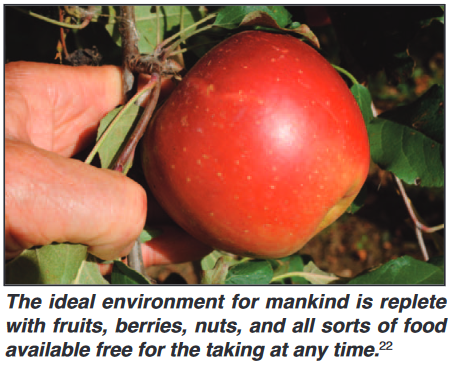 The variety of trees and plants was superb, such that a person’s full nutritional needs were supplied by the plant kingdom. All minerals, carbohydrates, protein, fatty acids, and vitamins came from the plant kingdom growing on remarkably fertile soils.
The variety of trees and plants was superb, such that a person’s full nutritional needs were supplied by the plant kingdom. All minerals, carbohydrates, protein, fatty acids, and vitamins came from the plant kingdom growing on remarkably fertile soils.
Clothing. Adam and Eve wore no clothing, but were clothed in the brilliant light that emanated from their perfect, sinless bodies. It was only after they sinned, by partaking of the tree of the knowledge of good and evil, that “… the eyes of both of them were opened, and they knew they were naked” (Genesis 3:7). Before that time they were both naked [erom, “nude”] and not ashamed [boosh, “feel ashamed or worthless”].21 Thus there was no need of clothing within the perfect Edenic environment; only with sin was there such a need, for Adam and Eve sewed fig leaves together to cover themselves. Afterwards Yahweh Elohim made coverings from skins to clothe them (Genesis 3:7, 21).
It is presumed that clothing of some sort would be needed once others were born and added to the family, although there are some cultures were clothing is not worn such as with some tribes in the Amazon jungle.23 Nudity within a perfect, bucolic climate which needs no insulating clothing would be perfectly acceptable for a husband and wife, but once children were around both they and their parents would logically cover themselves in the others’ presence. The clothing the Eternal provided was made from the skins of animals, which would be the type that people likewise would be expected to make. Those animals were locally grown. If clothes were to be made from woven fibers of cotton, flax, or other crops, these would likewise be locally produced.
Shelter. There would have been no need for houses in the Edenic world, since the climate would be conducive to outdoor living. This does not preclude the liklihood that structures of some sort did exist. After all, the Garden of Eden can be identified as the mountain of God — the center of Yahweh’s government — for we read in Ezekiel 28:13 that Lucifer was “… in Eden, the garden of God …,” and then was cast “… as a profane thing out of the mountain of God …” (Ezekiel 28:16), implying that Eden and the mountain of God were one and the same. The headquarters of Elohim at this “mountain” was luxurious and amazingly rich and beautiful, if the descriptions of the Father’s throne and the temple that John and Ezekiel described have any relevance here (Revelation 4:2-8; Ezekiel 1:22-28; chapters 40 to 48). Any structures built within the Garden of Eden would be of natural materials such as rock, wood, or various metals, likely obtained locally.
Distribution (transport) of goods and services. All of the needs for food, clothing, and shelter were provided within the Garden of Eden. The local supply of food and clothing is explicity stated in Genesis 2:16 and 21, and presumably the supplies needed for any building would also be found locally. With locally grown food clothing materials, and locally supplied building materials, transportation would also be local — by foot or perhaps by oxen or other animals. There was no need for long-range transport of necessities when everything needed was found locally. Genesis 2:11-12 does comment about gold and precious stones in the land of Havilah; we do not know the distance from Eden that this land was, but even though the gold and gemstones of Havilah were gathered for use in the Garden of Eden, we have no indication of the formation of a massive transport system to bring them there.
Energy economy. There is every indication that the energy utilized within the Garden of Eden was through ATP … or should we say muscle power. The principle work of Adam in the Garden was to tend and keep it (Genesis 2:28).
tend = adad, “work serve.”
keep = shamar, “guard, protect, attend to.”
We are told in Genesis 1:28 that people were to multiply upon the earth and subdue it, and have dominion over the fish, birds, and all living things’
subdue = kabash, “tread down, subjugate.”
dominion = radah, “subjugate, reign, bear rule.”
This being the case, there is no evidence that machines other than those that would enhance the use of the mind and muscles would be encouraged within this system of economy … complementing the body’s activities of tending and keeping, but not replacing them. The environment of the Garden of Eden would not require harsh work just to survive, as would be required outside the Garden.
“Cursed is the ground for your sake; in toil you shall eat of it all the days of your life. Both thorns and thistles it shall bring forth to you, and you shall eat the herbs of the field. In the sweat of your face you shall eat bread till you return to the ground …” (Genesis 3:17-19).
Esthetic and spiritual economy. I mention esthetics and the spirit in connection with economy because they are so critical in motivating the human spirit to live abundantly and produce. The beauty of one’s surroundings, the sounds and scents of birds and flowers, the bubbling, sparkling brooks and shimmering, silvery prairie uplift man’s spirits so he will move forward in life to be a diligent workman, possessing the great liberty of spirit to accomplish his calling.
The spirit of God provided the motivations of Adam and Eve to live and work in the Garden of Eden. This beauty of the heart, mind, and spirit to grant the best possible lifestyle and productivity possible explains why Yahweh Elohim stated in Genesis 2:9, “And out of the ground the Lord God made every tree grow that is pleasant to the sight and good for food.” It was the beauty [chamad, “to delight in, greatly beloved, delectable”] of the trees and the surroundings — to be enclothed by the colors, fragrances, sounds, and textures of God’s character — that motivated Adam and Eve in their wonderfully fulfilling tending and keeping. After all, how can you truly enjoy your existence unless it is filled with the joy, peace, love, kindness, faithfulness, patience, humility, and gentleness (Galatians 5:22-23) that surround you while you tend and keep your own garden?
Representation of value in the economy. The value of things in the economy of Eden were the things themselves. There was no need for a medium of exchange, which we call money — gold, silver, precious stones, wooden or metal tokens, paper bills, or any number of things — since the item was readily available as needed. When one was hungry, the fruit of a delightful fruit tree hung from a branch nearby. When one needed to build a shelter, the stones and timber were close by as well. Clothes would be made from the skins of animals or from the fibers of plants growing in the vicinity. No money system was needed in such an economy: the things needed were present nearby in abundance. Most needs could be obtained by walking, or with the help of a draft animal; needed bridges or roads were constructed by the community. If someone had a need he could not supply by himself, it was supplied freely by others who had the time, skills, and determination to serve freely.
“Ho! Everyone who thrists, come to the waters, and you who have no money, come buy and eat. Yes, come, buy wine and milk without money and without price” (Isaiah 55:1).
“And if you lend to those from whom you hope to receive back, what credit is that to you? For even sinners lend to sinners to receive as much back. But love your enemies, do good, and lend, hoping for nothing in return; and your reward will be great, and you will be sons of the Most High. For He is kind to the unthankful and evil” (Luke 6:34-35).
The Scriptures are also clear that usury (interest) is not to be charged for money lended (Exodus 22:25; Leviticus 25:36; Deuteronomy 23:19-20). Of course, with no money system and the directive that one should not expect to receive back that which is lended, this no-usury directive is irrelevant.
Land and taxation in the economy. The Garden of Eden was given to Adam without cost. He lived there as a servant of Almighty God, who gives land to whomever He desires (Daniel 4:17). It is man who imposes the evil system of cost and marketing of land atop God’s system of freedom. Abram was given the land of Canaan without charge (Genesis 12:7; 13:15-17; 15:7; 17:8), as were Isaac and Jacob after him. The land belongs to God, and He grants it to whomever He wills, without price.
The commands to Israel included a complete restriction from marketing land: “The land shall not be sold permanently, for the land is Mine; for you are strangers and sojourners with Me” (Leviticus 25:23). If a resident of Israel for some reason lost his land during the Jubilee cycle, on the 50th year the land was to be returned to its inheritor (Leviticus 25:24-28). Recall that the land was apportioned to families by lot when Israel entered the land of Canaan; there was no price attached to it (Joshua 13 to 21). What a contrast this system is to that of the present-day world, where virtually all land is priced … and taxed.
Not only was land not taxed in Eden, or in Israel as far as we know, but neither were taxes levied on production or income. Israelites paid a tithe to the Levitical tribe because they had no inheritance in the land as did the other tribes, but otherwise the eleven tribes paid no taxes (Numbers 18:20-21; Deuteronomy 14:22; Nehemiah 10:37).
Thus, we see in the economic system of the Creator some basic precepts of living that are highly contrary to our present system.
- The fruits of the holy spirit control the forces of production, distributing and consumption.
- No merchandising is involved: no buying and selling with a profit margin.
- No money system is used: the goods or services themselves represent the value.
- With no money system, no interest (usury) is charged.
- Provision is made for oneself, and for others that have needs which one can supply, without cost.
- Every person will be a “millionaire” in the sense of having an unlimited supply of essentials, free of charge, provided within an environment of beauty and plenty.
- It is a “pot luck” system, everyone serving those in need as those needs arise.
- Liberty of the spirit forms the basis of the loving relationships among families and between nations (Leviticus 25:10; Psalm 119:45; Luke 4:18; Romans 8:21; II Corinthians 3:17; Galatians 5:1, 13; James 1:25).
- The laws of God form the basis for abundant production, distribution, and consumption.
Mankind’s Economic Systems
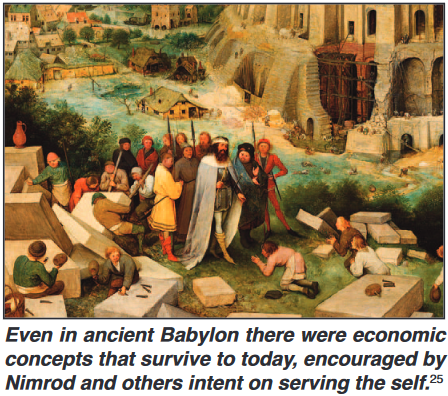 When sin entered the domain of mankind, the perfect system of production, distribution, and consumption of goods and services changed dramatically. Instead of a society filled with peace and abundance, the culture of mankind descended into a disorderly, selfish system that Flavius Josephus in The Antiquity of the Jews described as follows.
When sin entered the domain of mankind, the perfect system of production, distribution, and consumption of goods and services changed dramatically. Instead of a society filled with peace and abundance, the culture of mankind descended into a disorderly, selfish system that Flavius Josephus in The Antiquity of the Jews described as follows.
“… for he [Cain] only aimed to procure everything that was for his own bodily pleasure, though it obliged him to be injurious to his neighbors. He augmented his household substance with much wealth, by rapine and violence; he excited his acquaintance to procure pleasures and spoils by robbery, and became a great leader of man into wicked courses. He also introduced a change in that way of simplicity wherein men lived before, and was the author of measures and weights. And whereas they lived innocently and generously while they knew nothing of such arts, he changed the world into cunning craftiness. He first of all set boundaries about lands; he built a city, and fortified it with walls, and he compelled his family to come together to it; and called that city Enoch, after the name of his eldest son Enoch.”24
We see some obvious derivations that Cain injected into the economy of the world in which he lived … ways that are highly akin to the way of life in the modern world. Notice these traits of his civilization outside the Garden of Eden.
- A lifestyle aimed at maximizing pleasure and personal profit
- The extraction of wealth from one’s neighbors
- The introduction of weights and measures to enable a commercial economy to exist, in which goods and services took on monetary value and personal profits could be accumulated and stored
- A movement away from the fruits of the spirit — kindness, generosity, gentleness, and peace — towards violence, greed, rapine, and the accumulation of material goods
- Land divided into personal possessions, each parcel having a price
- People moving to cities rather than raising families in the open countryside
Historical records give a rough outline of the economies of the nations going clear back to Babylon, shortly after the Flood. Let us take a brief look at the economies of progressive civilizations throughout history, beginning at Sumer.
Ancient Babylon (Sumer). Shortly after the Great Flood, which occurred about 2,400 B.C. the kingdom that Nimrod built with its several cities (Genesis 10:8-12; 11:1-9) became a civilization that set the foundation for all the world ever since. How do we know that? Because Daniel 2 speaks of the great image that Nebuchadnezzar saw in a dream. It had a head of gold, chest and arms of silver, a belly and thighs of bronze, legs of iron, and feet of mixed iron and clay (Daniel 2:32-33). These parts of the image are identified with successive kingdoms to reign on the earth beginning with Babylon as the head, then Medo-Persia as the chest and arms, Greece as the belly and thighs, and Rome as the legs and feet. History and prophecy confirm these identities. When the image was struck in the feet by the “stone cut out without hands” (Jesus Christ; Daniel 2:34; Matthew 16:18; I Corinthians 10:4), the entire image collapsed and turned to dust, which symbolizes the return of Jesus Christ at the resurrection to take over authority of all nations on earth (I Thessalonians 4:16-17; I Corinthians 15:51-52; Revelation 19:11-21; 20:4). All of the civilizations of men, beginning with Babylon soon after the Flood, had maintained the precepts of the head of gold on through the millennia to the present time. The culture of Babylon was absorbed into all civilizations that followed, and they all fell into ignomy at one moment in time. This culture includes at its core the economic principles upon which civilizations have been based for about 4,500 years.
To add to Josephus’ comments above, sources say that the city states of Sumer developed a trade and market economy based on the commodity money of the shekel, which was a certain weight measure of barley. Later, the city states of Babylonia and its neighbors developed a system of pricing using a metric of various commodities which was fixed in a legal code. This may be considered the first written financial law on record, and it had many characteristics of the modern-day pricing system. These include interest rates, fines for “wrongdoing,” inheritance rules, laws specifying how private property is to be taxed or divided, and so on.
Temples in Babylon were the first documented creditors involving interest. They charged interest on their own assets and property, so legitimized the idea of interest-bearing debt, and profit-seeking in general.27
Ancient Medo-Persia, Greece, and Rome.28 On through the centuries following Babylon’s fall, commerce proceeded with little change, though coinage came in as a medium of exhance to a great degree. Alexander the Great of Greece facilitated international trade, as did the Caesars of Rome. Egypt was the wealthiest of all places in the Roman Empire, and some of that wealth found its way to Rome.
According to Herodotus and other scholars, the Lydians were the first to introduce the use of gold and silver coins in commerce; the first stamped coins are thought to have been minted around 650 to 600 B.C. A man named Heriod is considered by many to have been the first economist, since he wrote about the scarcity of resources. An Indian work, called The Arthashastra composed around 100 to 200 B.C., includes sections on political economy.
Greek and Roman thinkers made various economic observations, including Aristotle and Xenophon, and many other Greek writings show an understanding of sophisticated economic concepts.
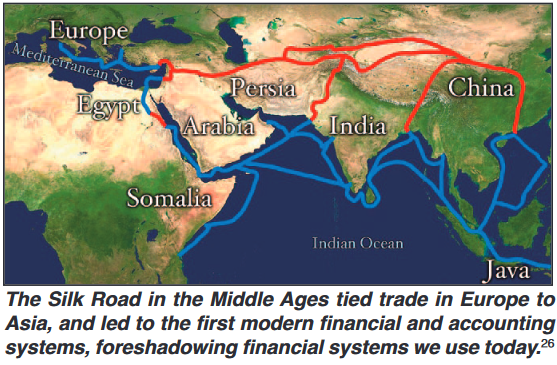 The Middle Ages.29 As the world’s population increased during the years 400 to 1500 A.D., economies and trade expanded as well. The Silk Road was used for trade between Europe, Central Asia, and China, and businesses in major Medieval cities in Italy created the first modern accounting and finance systems. Islamic economics was introduced during this time, and the first banknotes were used in the Tang Dynasty of China in the ninth century.
The Middle Ages.29 As the world’s population increased during the years 400 to 1500 A.D., economies and trade expanded as well. The Silk Road was used for trade between Europe, Central Asia, and China, and businesses in major Medieval cities in Italy created the first modern accounting and finance systems. Islamic economics was introduced during this time, and the first banknotes were used in the Tang Dynasty of China in the ninth century.
The Modern Era.30 Beyond the Middle Ages, economic activity became characterized by mercantilism, nationalism, and international trade. The coalescing of powerful monarchies — Spain, France, Austria-Hungry, Britain, and others — built strong militaries which demanded equipment and supplies that boosted requirements for needed raw materials. Mercantilism was a political movement and an economic theory that advocated the use of the state’s military power to ensue the protection of local merchants and supply sources. The first banknote in Europe was issued by Stockholms Banco in 1661.
The Industrial Revolution and beyond.31 Beginning about 1850, fueled by the use of coal and petroleum energy, the world rapidly changed along with its economic growth. Average GNP (Gross National Product) per capita across the globe shot upwards from about $1,300 in 1900 to about $7,300 by 2000. Major wars during this period, especially WWI (1914-1918) and WWII (1939-1945), resulted in major economic activity for the war efforts, but also helped expand post war reconstruction. The expanded use of shipping containers revolutionized international trade.
The Importance of Credit and Interest
It would be entirely inappropriate to neglect a discussion of the use of usury (interest) in economics throughout the history of civilization. Usury [neshek, “interest on a debt”] is utterly condemned in Scripture as we read in Exodus 22:25, Leviticus 25:36, Deuteronomy 23:19-20, Nehemiah 5:7, 10, Psalm 15:5, and elsewhere. Only to a foreigner was usury on a debt allowed (Deuteronomy 23:20), but never to a fellow Israelite.
Credit and usury have had a remarkable impact on the history of the world, between individuals and between nations. “The rich rules over the poor, and the borrower is servant of the lender” (Proverbs 22:7). This fact has profound implications regarding government at all levels.
Personal level. The borrower is put in a subservient position to the lender, which violates the core of God’s governmental structure that no one is to rule over another person. This fact is clarified by the fact that Jesus Christ is called the “firstborn among many brethren,” not their overlord (Romans 8:29). Our heavenly Father is “no respector of persons” (Acts 10:34; Romans 2:11; Ephesians 6:9; I Peter 1:17), nor are we, the brethren, to play favorites of one another, placing greater value or respect upon some at the expense of others (James 2:9).
National level. As with individuals, a nation is placed under the authority of others if its government owes a debt to another nation, or to banking entities that lend it funds. The loaning of funds from the privately-owned Federal Reserve System is one example of this evil situation, where the whims of bankers or other nations to whom the nation is indebted can dictate actions and policies to the debtor nation. The 30+ trillion dollar debt of the United States to its creditors is a prime example of this atrocious assault on sovereignty.
While it will be impossible in this short paper to outline in detail the history of credit and usury throughout the post-Flood world, a brief review will be made. In his work 3000 BC-500 AD — The Rise and Fall of Babylon-Greece-Rome by Martin Armstrong,32 some profound admissions are made.
“Credit is usually thought of as a modern invention of perhaps only a few hundred years old. It is true that a few more clever forms of credit have emerged during our current century such as plastic credit cards. But beyond that, credit has existed long before man invented an official form of money. Credit has existed from the very dawn of civilization. Man has always attempted to borrow from his neighbor if not cold hard cash, then at least a cup of sugar now and then. Some say that prostitution is the oldest profession; history actually suggests that the oldest profession may indeed be that of the moneylender.”
A man named Hammurabi, king of the first dynasty of Babylon, authored the first recorded formal laws of credit and interest around 1000 B.C. Hammurabi established a ceiling for interest rates that could be charged to a borrower, of 33.3% per year. Loans on silver were limited to 20%. Even earlier, in India in the 24 century B.C., interest rates were capped at 24% by the Laws of Manu.33
Hammurabi’s laws specified that the loan transaction had to be witnessed by a public official and recorded in writing. If the lender charged more than the specified limit, the loan was canceled. Collateral could be land or some other possession, or even one’s wife, children, and slaves … even oneself. Records of international loans between Babylonia, Assyria, Elam, Syria, and the Hittites have been uncovered on clay tablets.34
Banking also existed in ancient Babylon, where two major banking establishments performed functions much like do modern banks. The banking houses of the Egibi Sons and the Muradsu merchants engaged in large-scale operations, lending to individuals, merchants, and governments. Deposits earned interest, and venture capital transactions occurred, where the bankers became the financing partner. All told, the sophistication of the banking enterprises of Babylon and succeeding empires were surprisingly modern, with drafts, accounts, transfers, deposits, and even overnight rates of interest.35
Along with banking and the widespread use of credit, history is littered with debt crises clear from Babylon, this side of the Flood, up to today. Virtually every government that has existed has overborrowed, which has resulted in the decline and collapse of the state. During good economic times the interest rates were low, but they rose during times of crisis and trouble. That trend is repeated today in Third World nations where loan risk is high, and interest rates are consequently high.
During the period of 2400 to 1200 B.C, the vibrant economy around the Aegean Sea was based on cattle as the standard of value. Gold was a store of value and exchange, but it followed livestock, as during Abram’s wanderings around 2000 B.C. (Genesis 13:2; “Abram was very rich in livestock, in silver, and in gold”). In those days, cattle would be as gold is today, and gold would be as paper currency is today.
Once Crete fell in 1400 B.C., the Mediterranean world fell into economic chaos that eventually led to what has become known as the Dark Ages. As the world emerged from this period, money was first coined in Lydia — a part of modern Turkey — and inflation, wild speculation, and hoarding became common. Whenever speculation booms, history has repeatedly shown that there is inevitably a proverbial bust, so that in Athens in 594 B.C. a severe credit crisis prompted the Laws of Solon to be enacted. Though a poet, Solon revised Greek laws to try and correct the economic devastation, which had led to farmer rebellion, slavery of entire families, and even the sale of family members in overseas markets.36
Thus, the Laws of Solon in the early 6th century B.C. were the first major reform of the legal code of Hammurabi. Though legal limitations on the rate of interest were lifted, personal slavery was banned, those enslaved by debt were freed, those sold into slavery to other lands were returned, and many debts were cancelled. Political power returned to property owners, and inflation was dealt with by devaluation of the currency. The history of economic collapse in response to interest and greed had repeated itself time and time again, and society suffered greatly.37
During the period 600 B.C. to the time of Christ, many of the major creditors were pagan temples, such as the temple of Delphi in Athens, which is often referred to as “the financier of the Greek Empire.” The priests of Delphi were money lenders, and professional money managers emerged, one of their clients being Socrates himself. The states were among the worst clients of all: more often than not they never repaid a debt. For instance, from 377 to 373 B.C. only two out of thirteen loans to Greek states or cities were repaid. The loss of confidence in government during this time was thus very high.38
The Roman government was forced to reign in interest rates early in its history due to severe credit crises. The Twelve Tables of around 450 B.C. set an interest limit of 8.3% per annum, with severe penalities for exceeding this limit. According to Armstrong,
“The Roman experience with credit forms yet another long list of trial and tribulation. Major widespread debt crises affected the Roman State many times through the early Republican era …. Julius Caesar used a similar tactic [of alleviating the debt crisis] … which had undoubtedly provided some incentive for his assassination, since many of the money lenders were in reality the senators of Rome.”39
Through the centuries of the Roman Empire up to the present time little has changed regarding credit and interest rates. The borrower is always the servant of the lender. One interesting consequence of the chaos caused by usury and economic duress is that, during the first centuries A.D., the idol-worshipping people failed to get answers when they prayed to their gods. So many of them consequently turned to Christianity, which promised hope through all of the crises that the greed-driven bankers and governments had fomented.
Note the great fluctuations in interest rates in the following graph since the time of Babylon to the present.40
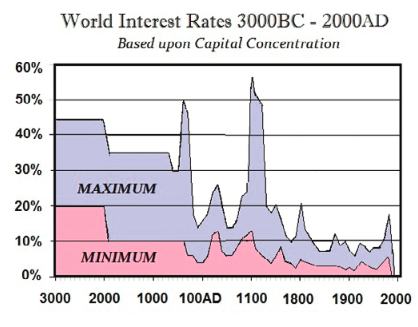
A Brief History of Modern Economics
Let us now, after this very brief review of the history of credit and interest, evaluate the ideas of the major designers of modern economic theory … that “dismal science,” as some have called it. Before the period of “classical economic theory” most national economies were hierarchical command-and-control, monarchic government policy systems. But, with the birth of Western capitalism and the Industrial Revolution, economic theory had to change in response to these dramatic shifts in self-regulating capitalistic structures.
The most influential thinker who influenced modern economic theory was Adam Smith. He was an 18th-century Scottish economist and philosopher. His degree at Bailiol College at Oxford University was in European literature, but he gained a professorship in moral philosophy at Glasgow University in 1751,where he published the book The Theory of Moral Sentiments41 in 1759. He moved to France in 1763 to become a tutor for the stepson of Charles Townshend, the future Chancellor of the Exchequer. During this time he rubbed shoulders with David Home, Voltaire, and Benjamin Franklin.
Then, in 1776 he published The Wealth of Nations,42 which became the centerpiece of classical economics from that point on up to the Great Depression. It is interesting that this is the same year that the Declaration of Independence was penned in the United States, which served as the philosophical framework for the greatest nation on earth in modern times … a Constitutional Republic founded largely on Biblical principles that inspired the independence of nations throughout the world.
Smith traced the evolution of human society through three stages:
(1) A hunter stage without property rights or fixed residences, to nomadic agriculture with shifting residences
(2) A feudal society where laws and property rights are established to protect privileged classes
(3) A modern society characterized by laissez-faire or free markets, where new institutions are established to conduct market transactions
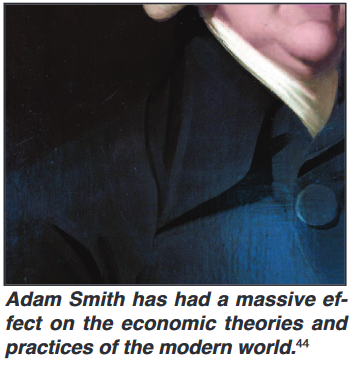 The philosophy of free markets emphasizes a minimal role of government intervention and taxation. Smith saw government as responsible only for education and defense of a country. Laissez-faire means “leave it be,”43 and applied to economics implies that the less the government is involved in the economy the better off business will be, and by extension society as a whole. It is the key to free-market capitalism. Adam Smith defined the “economic man” as someone who pursues self-interested goals and interests, which impacts his behavior in the economic realm.45
The philosophy of free markets emphasizes a minimal role of government intervention and taxation. Smith saw government as responsible only for education and defense of a country. Laissez-faire means “leave it be,”43 and applied to economics implies that the less the government is involved in the economy the better off business will be, and by extension society as a whole. It is the key to free-market capitalism. Adam Smith defined the “economic man” as someone who pursues self-interested goals and interests, which impacts his behavior in the economic realm.45
This economic man, pursuing his major interests, was guided by an “invisible hand,” as he called it, which guides the forces of supply and demand. By looking out for themselves, all people would inadvertently create the best outcome for all. Thus, the farmer, butcher,and brewer would each make money by selling products that people have need of. While engaging in their own enterprises, they also provide products that others want. Each person would benefit, as would the welfare of the entire nation.46
There is considerable backing for this model of economic organization in God’s word. All men are born with certain gifts at which they excel, and are expected to utilizer those gifts for the benefit of others … at least in the spiritual sense (Romans 12:4-8; I Peter 4:10). The physical application of these principles is implied in Scripture as well.
“Nothing is better for a man than that he should eat and drink, and that his soul should enjoy good in his labor. This also, I saw, was from the hand of God” (Ecclesiastes 2:24).
What God has made you to do, that you ought to do in life, for such work gives you rewards and fulfillment, makes life worth living, and as a consequence serves one’s fellow man with good fruits from your hand. However, Smith also believed in a framework of competition among producers to undergird this ideal economy. Therefore, a fair and equitable justice system is essential to protect and promote free and fair competition. He termed this competition as “… the desire that comes with us from the womb, and never leaves us, until we go unto the grave.”47
Here we see Adam Smith borrowing from the sins of a fallen world to justify the ideal of competition, that competitive nature being the desire to excel over someone else rather than serving that person. The motivation of one’s work here is key: Smith is using the human spirit’s intent upon subduing and overcoming one’s fellow man in the theater of production, versus the godly spirit’s motivation to serve and uplift one’s neighbor. The motivations are opposed — overcoming one’s neighbor versus loving one’s neighbor — and while the end result in economic terms of production may be similar, the price in terms of joy and fulfillment in lives can be massively different. The difference in approach of the two systems parallels this world’s (Satan’s) governmental structure versus God’s system. The ends do not justify the means. Yet, within this world of sin and suffering the economics of Smith do work … and work quit well.
Adam Smith’s economic philosophies worked well within Western societies moving into the Industrial Revolution, going from land-based wealth to wealth created by assembly-line production methods made possible by the division of labor. Smith used the example of manufacturing a pin to make his point. If one person were to undertake the 18 steps required to complete the tasks, they could make only a handful of pins a week. However, if the 18 tasks were completed along an assembly line by 10 people, production would jump to thousands of pins per week. Each person specializing in a specific part of the production process would greatly speed the process and increase properity for all.48
The downside of this philosophy is that individual workers would lose the joy and fulfillment of making complete pins that could be provided for others in need. Along the assembly line, he would become a machine himself, an automaton with very limited scope in his work … like a farmer, who must be a jack-of-all-trades, moving from his land to a city where he functions much more like a robot in an assembly line, and in the process loses touch with the beautiful green fields and forests, trilling songbirds, and billowing clouds of his former abode. He has traded his liberty in Eden for the captivity of a city.
Marxism Enters
Adam Smith believed that the labor of the poor is a key measure to how an economy performs, and was concerned about inequality of working people. Karl Marx, a Jewish political economist, was greatly inspired by The Wealth of Nations,49 but while Smith wrote that capitalism was an ideal state for economic growth, Marx believed that capitalism led to greed and inequality among people and would ultimately lead to economic collapse.
 What Marx failed to recognize was that any sort of economic system does not lead to greed in and of itself; rather, greed precedes it. Greed is built into the very nature of the human spirit, and whatever system one might desire to govern the production, distribution and consumption of goods and services, people will still — if human nature is left unchecked — strive to get the most for themselves. Marx, an atheist, did not address the reality of who man is, a creation in the image of God, with the potential to do good or evil. Sadly, his political and economic philosophies struck a chord with the Khazarian Jews of Europe and elsewhere, leading to the violent overturn of the Czar of Russia in the Bolshevik Revolution.
What Marx failed to recognize was that any sort of economic system does not lead to greed in and of itself; rather, greed precedes it. Greed is built into the very nature of the human spirit, and whatever system one might desire to govern the production, distribution and consumption of goods and services, people will still — if human nature is left unchecked — strive to get the most for themselves. Marx, an atheist, did not address the reality of who man is, a creation in the image of God, with the potential to do good or evil. Sadly, his political and economic philosophies struck a chord with the Khazarian Jews of Europe and elsewhere, leading to the violent overturn of the Czar of Russia in the Bolshevik Revolution.
The planks of this perverted political economic system, as outlined in the Communist Manifesto,51 are as follows:
1. Abolition of private land holdings, and rents of land for public purposes
2. Heavy progressive income tax
3. Abolition of rights of inheritance
4. Confiscation of property of emigrants and rebels
5. Centralization of credit to the State, using a national bank
6. Centralization of communication and transport with the State
7. State-owned factories and production, and bringing wastelands into production
8. Equal liability for all to work, with “industrial armies”
9. Combination of agriculture with manufacturing
10. Free education for children in public schools, and the combining of education with industry
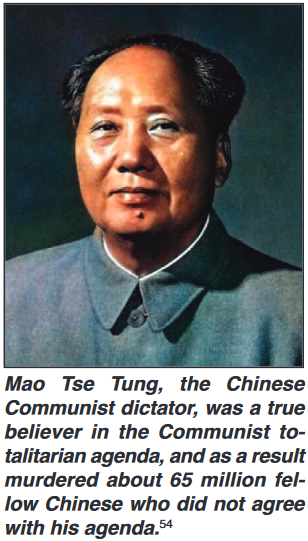 Marx himself, though married, paradoxically was an enemy of marriage. He and his wife bore seven children, four of which died before adulthood from the effects of poverty. He survived with occasional contributions from his friend Frederick Engels, while he sat thinking about economic theories of how working men ought to own the factories through government control, while he himself never lifted a finger to work and support his own family.52 It is even more amazing that his Communist philosophies have been taken seriously over the years since his death when countries where these practices have been tried — Cuba, North Korea, China, and Russia — have proven to be disastrous. Repression of God-given liberty, starvation, privation, and death in gulags has been the result of Marx’s theories in real life, a system whereby the few have become wealthy through brutal authoritarian rule while the masses of workers, who are supposed to control production, are brutally repressed. During the 20th century, an estimated 94 million people have died from idealogical conflict under Communist repression.53
Marx himself, though married, paradoxically was an enemy of marriage. He and his wife bore seven children, four of which died before adulthood from the effects of poverty. He survived with occasional contributions from his friend Frederick Engels, while he sat thinking about economic theories of how working men ought to own the factories through government control, while he himself never lifted a finger to work and support his own family.52 It is even more amazing that his Communist philosophies have been taken seriously over the years since his death when countries where these practices have been tried — Cuba, North Korea, China, and Russia — have proven to be disastrous. Repression of God-given liberty, starvation, privation, and death in gulags has been the result of Marx’s theories in real life, a system whereby the few have become wealthy through brutal authoritarian rule while the masses of workers, who are supposed to control production, are brutally repressed. During the 20th century, an estimated 94 million people have died from idealogical conflict under Communist repression.53
The fact that Marx hated marriage was underscored by David Solway.
“In its centuries-long efforts to dismantle the load-bearing structures of traditional and classical liberal society, Marxist dogma in its various forms has embarked on a sustained campaign to weaken and ultimately to abolish the institution of marriage as it has been commonly understood from time immemorial. The dissolution or imprison of marriage, as a contract between a man and a woman committed to raising a family and recognizing its attendant responsibilities, is a prerequisite for the revolutionary socialist state in which the pivotal loyality of the individual belongs to the sovereign collective, not to the family.”55
There is no place for a strong family within Communism’s master plan. Its perverse agenda reeks of the likes of the book 1984,56 when child procreation was considered to be a duty to the state, absent of love between husband and wife.
Keynesian Economies and the Great Depression
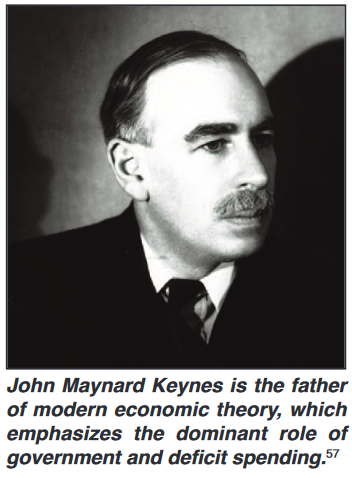 While Adam Smith’s economic paradigms held sway over much of the world until the Great Depression, when the United States and world economies entered a time of stubborn stagnation in the 1930s, an apparent savior for the crisis entered the frey. His name was John Maynard Keynes.
While Adam Smith’s economic paradigms held sway over much of the world until the Great Depression, when the United States and world economies entered a time of stubborn stagnation in the 1930s, an apparent savior for the crisis entered the frey. His name was John Maynard Keynes.
Before going into the details of his philosophical approach to economics, it is worthy of note that this revered economist was a homosexual pedophile. According to one author,
“Keynes was a libertine hedonist who wasted most of his adult-life engaging in sexual relationships with children, including traveling around the Mediterranean visiting children’s brothels. Keynes was part of a generation that rose against Victorian traditions and regarded them as a repressive institution to be brought down. It is impossible to understand the economies of Keynes without understanding the kind of morality he wanted to see in a society he increasingly believed he could shape according to his own will.”58
Keynes collected and catalogued his sexual activities as other men collect postage stamps. He kept detailed records of his encounters, including their names and dates of the contacts. While he did eventually marry, his personal life was colored by unfaithfulness and casual encounters. How could his personal sexual libertinism not color the development of his economy-destroying theories?59
Faced with the heart-rending realities of the Great Depression, Keynes put together his ideas in a book entitled The General Theory of Employment, Interest, and Money,60 in which he argued against classical economic theory and came up with his own ideas. He advocated a countercyclical fiscal policy in which, during periods of economic trouble, the government should undertake deficit spending to make up for the decline in investment and boost consumer spending in order to stabilize demand. By spending more borrowed money and cutting taxes, a budget deficit would increase consumer demand and lead to an increase in economic activity and a reduction in unemployment.61
Keynes also criticized personal savings, saying these funds should rather remain in circulation to stimulate economic activity. His approach to correcting the Great Depression, however, has been challenged by other economist — like Milton Friedman and Murray Rothbard — who argue that businesses will tend to return the economy to a state of equilibrium unless the government prevents them by interfering with prices and wages. Through the “multiplier effect,” one dollar spent in fiscal stimulus eventually creates more than one dollar of growth. By using this argument, government economists could provide justification for politically popular spending projects on a national scale.62
Keynes’ promotion of government intervention to try and pull the U. S. out of the Great Depression was a hideous mistake. Some may question whether his theories were a product of the devil’s own deceptions injected into this homosexual/pedophile’s mind to destroy the wealth of the nation. Can debt solve anything? The borrower is the servant of the lender, and the lender in part was the Federal Reserve System, a privately-owned bank whose designs towards the U. S. were anything but pure. The triggers to the Depression were a four-phase government intervention.63
(1) The government’s “easy money” policies caused an artifical economic boom and subsequent crash.
(2) President Herbert Hoover’s interventionist policies after the crash suppressed the self-adjusting aspect of the market, preventing recovery and prolonging the recession.
(3) After Herbert Hoover left office, Franklin Roosevelt’s “New Deal” expanded Hoover’s interventionism into nearly every aspect of the economy, extending and deepening the Depression.
(4) Labor laws, such as the Wages Act, struck the final blow to the remaining healthy sectors of the economy, dragging down the remaining productive businesses.
Thus, it was the government that caused the Great Depression, and Keynesian economics was major part of the problem. Ben Bernanke, former governor of the Federal Reserve, even admitted this fact in a speech in 2002.64 Rather than allow the economy to self-correct, government intervention and the banking system became the enemy of the people The result gives teeth to the adage, “Whenever the government gets involved, things turn our badly.”
Hands Off … God’s Will Be Done
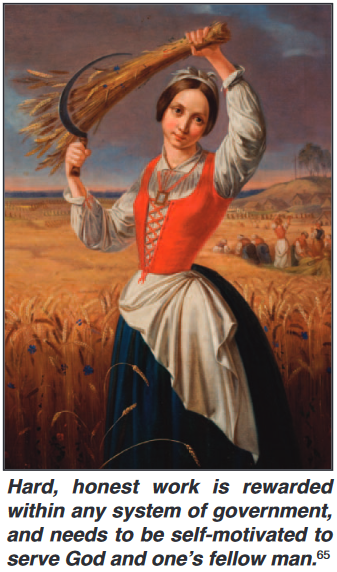 The laisse-faire economic theories of Adam Smith are reasonably close to a proper system of production, distribution, and consumption of goods and services, given the type of industrial-technological-digital world we live in today. Ideally there should be no government intervention whatsoever in the economy of people, communities, and nations, as we saw at the beginning of this paper in God’s perfect Edenic environment. Neither is there any place for money as a medium of exchange: the goods and services themselves constitute their value, not some artificial unit of cattle, gold, silver, paper, or computer digits. Usury finds no place whatsoever within a Godly system: money charged for the use (loaning of) money is totally unproductive, but rather bleeds the wealth from the borrower while the lender sits by and produces nothing.
The laisse-faire economic theories of Adam Smith are reasonably close to a proper system of production, distribution, and consumption of goods and services, given the type of industrial-technological-digital world we live in today. Ideally there should be no government intervention whatsoever in the economy of people, communities, and nations, as we saw at the beginning of this paper in God’s perfect Edenic environment. Neither is there any place for money as a medium of exchange: the goods and services themselves constitute their value, not some artificial unit of cattle, gold, silver, paper, or computer digits. Usury finds no place whatsoever within a Godly system: money charged for the use (loaning of) money is totally unproductive, but rather bleeds the wealth from the borrower while the lender sits by and produces nothing.
 These considerations require a people filled with love, joy, peace, kindness, gentleness, patience, and moderation (Galatians 5:22-23). Governments of men step in to regulate and control people when there is a vacuum of Godly values. It is a natural progression of things, and ironically an expression of the Creator’s care for us, His protection from the evils of this world through a plethora of appointed magistrates whose commission is to protect the saint’s (Romans 13:1-7). Without the proliferation of evil there would be no need for an abundance of police to protect the saints. Notice the very next verse after the command to render taxes to those government officials: “Owe no one anything except to love one another, for he who loves another has fulfilled the law” (Romans 13:8).
These considerations require a people filled with love, joy, peace, kindness, gentleness, patience, and moderation (Galatians 5:22-23). Governments of men step in to regulate and control people when there is a vacuum of Godly values. It is a natural progression of things, and ironically an expression of the Creator’s care for us, His protection from the evils of this world through a plethora of appointed magistrates whose commission is to protect the saint’s (Romans 13:1-7). Without the proliferation of evil there would be no need for an abundance of police to protect the saints. Notice the very next verse after the command to render taxes to those government officials: “Owe no one anything except to love one another, for he who loves another has fulfilled the law” (Romans 13:8).
Profit Maximization
A topic not discussed at length so far but which is very important within modern economic theory is the concept of profit maximization. Virtually all corporations follow this dictum, which is usually adhered to within the construct of a faceless board of directors. I Timothy 5:18 states that you must not muzzle the ox while it treads out the corn (from Deuteronomy 25:4), and the laborer is worthy of his wages (from Luke 10:7) … and Jesus Himself indicated that people need to be ambitious in their approach to their work. Hard work and increase are essential within God’s plan for us, but is that all there is to making profit?
Note Matthew 25:14-30 and Luke 19:11-27. In both stories the servants are given a sum of money — five, two, and one talent in Matthew’s account, and one mina in Luke’s account — and the master went on a journey. These servants were to use this money wisely and increase it. On returning, the account in Matthew reveals that the servants who received the five and two talents had doubled their money, while in Luke’s account one servant had multiplied his mina ten times, while another had multiplied it five times. The servant who refused to work and increase the money given to him was severely castigated, and even what he had been given was taken away.
Of course, this story is a parable, but the meaning is clear that one is expected to increase his substance, and by implication his spiritual gifts, to the best of his ability. The value of hard work is emphasized in Scripture.
“In all labor there is profit, but idle chatter leads only to poverty” (Proverbs 14:23).
“He who has a slack hand becomes poor, but the hand of the diligent makes rich. He who gathers in summer is a wise son; he who sleeps in harvest is a son who causes shame” (Proverbs 10:4-5).
“The hand of the diligent will rule, but the lazy man will be put to forced labor” (Proverbs 12:24).
“Whatever your hand finds to do, do it with your might; for there is no work or device or knowledge or wisdom in the grave where you are going” (Ecclesiastes 9:10).
“Let him who stole steal no more, but rather let him labor, working with his hands what is good, that he may have something to give him who has need” (Ephesians 4:28).
“He who tills his land will have plenty of bread, but he who follows frivolity will have poverty enough! A faithful man will abound with blessings, but he who hastens to be rich will not go unpunished” (Proverbs 2819-20).
“Yes, you yourselves know that these hands have provided for my necessities, and for those who were with me. I have shown you in every way, by laboring like this, that you must support the weak. And remember the word of the Lord Jesus, that He said, ‘It is more blessed to give than to receive’” (Acts 20:34-35).
The essence of these instructions is to work hard at what you do in service to God first, and also to your fellow man, and financial rewards will come to you. The key to our labor is the service we provide for our fellow man, even as Abraham and Job were the servant-oriented administrators of substantial agricultural enterprises, and as a result were very rich in material goods (Genesis 13:2: Job 1:3). Yet, both of these notable patriarchs set their hearts not on their riches, but on the Creator above all. Note Abraham’s unswerving obedience to God’s call to travel to Canaan, not knowing where he was going (Hebrews 11:8), and Job’s unflinching dedication to God in spite of having lost all of his livestock and children (Job 1:21-22).
We also note in James 5:1-6 how James castigated the brethren who were rich and increased in goods, yet failed to honor the needs and just returns for those that worked for them.
“Come now, you rich, weep and howl for your miseries that are coming upon you! Your riches are corrupted, and your garments are moth-eaten. Your gold and silver are corroded, and their corrosion will be a witness against you and will eat your flesh like fire. You have heaped up treasure in the last days. Indeed the wages of the laborers who mowed your fields, which you kept back by fraud, cry out; and the cries of the reapers have reached the ears of the Lord of Sabaoth. You have lived on the earth in pleasure and luxury; you have fattened your hearts as in a day of slaughter, you have condemned, you have murdered the just; he does not resist you.”
Here we see that the managers and owners of businesses must pay just wages to their workers. Withholding those wages from them is fraudulent, stealing from them what is just and right, and the Eternal takes note of this fraud and will mete our judgement against these selfish managers, in due time.
In the context of present day business owners and corporations, the idea of maximizing profits is comes from a heart of pride and selfishness, rather than of service to those in need. With the advent of fiat money, and on top of that money now stored as digits in computers, it is possible for tech-savvy computer operators and financial manipulators to amass wealth to colossal levels. We now find not just millionaires, but billionaires in our midst. These people have usually used self-centered and oftentimes illegal means to amass this wealth, and they continue to build these astronomical accounts because pride and avarice know no bounds.
Profit maximization for the sake of accumulating wealth in and of itself is part of the present economic paradigm. It is hardly a precept of the Eternal’s desire, and does not lead to righteousness. We read in Proverbs 18:23 that “The poor man uses entreaties, but the rich answers roughly.” Having much wealth does not build righteous character: of gentleness, kindness, love, and humility. It has the opposite effect. Rather, profit maximization — not to be confused with wisely using one’s funds and assets — expresses no conscience to the party that strives for it, but leads to companies locating their production if countries having cheap labor, minimizing wage levels to the bare minimum, and encouraging housewives to work just to make ends meet and thus weakening families.
Freedom and Liberty
The economic system in place within a nation has everything to do with the freedom and liberty that we as Christians enjoy. Notice the chart below.
Israel kept three Feast periods — the Days of Unleavened Bread, the Feast of Weeks, and the Feast of Tabernacles (encompassing Trumpets, Atonement, and the Last Great Day as well) — so the males would be gone from home for 8 (Unleavened Bread) + 1 (Weeks) + 23 days (the fall Feasts), plus travel time to the place His name was placed. THEY HAD A “FREE” SOCIETY WITHOUT THE NEED FOR BURDENSOME TAXES, CARS, LAND, HOUSES, UTILITIES, ETC., WHICH REQUIRE A PERSON TO REMAIN GLUED TO AN EMPLOYER’S JOB CONTINUALLY, and makes it difficult to take time off work for these Feast days. Such was the liberty of the Levitical system of land … land without cost that remained in the family forever, and only a 10% “fee” (tithe) on the increase of grain, fruit, and livestock from that land. The increase from the land was indeed the true wealth of the people. They had true liberty to use their time as they willed, within God’s laws.
We today have a system where one must earn money to survive, and 50 to 70% of that is taken away by the government. THAT RESTRICTS GREATLY WHAT PEOPLE ARE FREE TO DO AND MAKES THEM SLAVES OF THE STATE, THE BANKER, THE MORTGAGE COMPANY, AND OTHERS WHO PLACE ONE IN DEBT; THE BORROWER IS THE SERVANT OF THE LENDER, AND A SLAVE!
The economics of God’s system deals with land and its plants and animals, and labor, the two essential inputs to life, in a most wonderful way.

Land: God gives it to whomever He desires (Daniel 4:17), and has placed upon it the plants and animals for the sustenance of man, adapted to the climate as He has determined.
a. Individual farms ==> the family kingdom (Micah 4:4; Amos 9:13; Joel 2:24; 3:18)
b. Many farms ==> the national kingdom
Labor. God commands that one “tend and keep” (Genesis 2:15) the land, which requires work, enjoyable work (Ecclesiastes 2:24).
a. Help the poor (Leviticus 19:9-10; Deuteronomy 15:7-8; II Thessalonians 3:10; Ephesians 4:28).
b. In the next age all will be “millionaires,” so the poor will disappear.
c. All people will work diligently, without the crime, war, and evil of this age, obviating the need for a central government and need for military and police forces (Micah 4:3; Isaiah 2:4; Zechariah 3:10; I Corinthians 4:12; Ephesians 4:28; I Thessalonians 4:11).
Though we do not have the millennial system in place today, by practicing the ways of the Eternal it is possible even in this evil age to prosper greatly. A fine example of giving land to individual families to work, even within the Communist system of China, reveals just how prosperous a single application of personal responsibility can be. Let Michael Meyer in The Wall Street Journal tell the story.67
“Forty years ago this spring, corn farmers in Xiaogang village, in the central province of Anhui (where Pearl Buck set The Good Earth), reported a grain yield of 66 metric tons. This single harvest equaled the village’s total output between 1955 and 1970 — but for once the figure was not exaggerated. In fact, villagers underreported their actual yield by a third, fearing officials would not believe their record haul.
“What caused this massive spike in production? A new fertilizer or hybrid seed? Better equipment? A catchy, rhymed propaganda slogan? No: Xiaogang’s farmers were starving. After taking power in 1949, China’s Communist Party had effectively abolished private land ownership, grouping farms into “people’s communes” subservient to the state. By 1978 villages were crippled by quotas that seized most of what they grew for redistribution.
“Only that season, there was no food. Xiaogang’s farmers dug up roots, boiled poplar leaves with salt, and ground roasted tree bark into flour. Families left their thatched-roof homes and took to the road to beg.
“On the night of November 24, 1978, a farmer named Yan Hongchang summoned the heads of the village’s desperate families to a clandestine meeting. On paper torn from a child’s school workbook, the farmers wrote a 79-word pledge to divide the commune’s land into family plots, submit the required quota of corn to the state, and keep the rest for themselves.
 “In 1624 Pilgrims in the American colonies attempted a similar reform: after two years of food shortages at Plymouth, the settlement abandoned communal farming for family plots. People worked harder than before, with women and children joining men in the field. The colony never starved again.
“In 1624 Pilgrims in the American colonies attempted a similar reform: after two years of food shortages at Plymouth, the settlement abandoned communal farming for family plots. People worked harder than before, with women and children joining men in the field. The colony never starved again.
“But American Pilgrims did not fear charges of sedition. ‘In the case of failure,’ the Xiaogang farmers’ pledge concluded, ‘we are prepared for death or prison, and other commune members vow to raise our children until they are 18 years old.’ Then they signed their names.
“By springtime the commune’s chief said the group had ‘dug up the cornerstone of socialism,’ and threatened severe punishment. But a cadre above him eyed the record harvest — and a 20-fold increase in annual family income. The official told Mr. Yan he would protect Xiaogang and the rebellious farmers, so long as their experiment didn’t spread.”68
As for all of God’s precepts, we must live in them to reap His rewards (Leviticus 26:1-13: Deuteronomy 28:1-14). We are living in this world, but we are not of this world (John 17:14-18). Our key is to not play according to this world’s rules, and avoid the competitive ladder and the compulsion to amass material wealth for ourselves. We are to love, not compete. We are to lift up our fellow man under his heavy burdens, not weight him down with rejection and tale-bearing.
Let us follow the wonderful teaching of our heavenly Father, who inspired the Apostle Paul to write,
“Owe no one anything except to love one another, for he who loves another has fulfilled the law. For the commandments, ‘You shall not commit adultery,’ ‘You shall not murder,’ ‘You shall not steal,’ ‘You shall not bear false witness,’ ‘You shall not covet,’ and if there is any other commandment, are all summed up in this saying, ‘You shall love your neighbor as yourself.’ Love does no harm to a neighbor; therefore love is the fulfillment of the law” (Romans 13:8-10).
If you follow this pathway of love and keeping God’s commandments you are fulfilling the way of love (I John 5:3), and doing to others as you would have others do to you (Matthew 7:12), you are living within God’s economic system — His Edenic system of the production, distribution, and consumption of goods and services. Follow this pathway, in the footsteps of Jesus Christ (I John 2:6), and you will be blessed. The world will hate you for it (John 15:19; 17:14), but in the end you will inherit life everlasting!
Bibliography
1. Anonymous, Merriam-Webster Dictionary, www.merriam-webster.com/dictionary/economics.
2. Anonymous, Traditional economy, www.wikipedia.org/wiki/Traditional_economy.
3. Picture from Thomas Cole, 1828, Amon Carter Museum of American Art, public domain.
4. See 2.
5. Paul W. Syltie, Millennial Agriculture, a Key to Understanding the Kingdom of God, Triumph Publishing Company, Altadena, Califronia, 1981, page 27.
6. E. F. Schumacher, Small Is Beautiful, Economics As If People Mattered, Harper Colophon Books, New York, 1973, pag 140.
7. Anonymous, Command economy, www.britannica.com/money/command-economy.
8. See 7.
9. See 7.
10. Boris Egorov, How the newborn Soviet state took capitalist help and hushed it up, Russia Beyond, www.rbth.com/history/328834-soviet-state-took-capitalist-help.
11. Picture from Tass, www.qminder.com.jp.
12. Personal information, Paul W. Syltie.
13. John W. De Pauw, The private sector in Soviet agriculture, Cambridge University Press, January 27, 2017, in Slavic Review , Volume 28(1), March, 1969, pages 63 – 71.
14. Peter J. Boettke and Robert L. Heilbroner, Economic system, December 20, 2023, Encyclopedia Britannica, www.britannica.com/money/topic/economic-system.
15. Alan Stout, private communication.
16. Anonymous, Blackrock, www.wkipedia.org.
17. Tim Lemke, The 10 largest investment management companies worldwide, The Balance, March 17, 2022, www.thebalancemoney.com/which-firms-have-the-most-assets-under-management-4173923.
18. Anonymous, Blackrock CEO slammed for “forced behaviors” comment after 2017 interview reemerges about DEI inititatives, FOX Business, June 5, 2023, www.foxbusiness.com/politics/blackrock-ceo-slammed-force-behaviors-dei-initiatives.
19. Picture from https://blog.hdwallsource. com/15-beautiful-hd-stream-wallpapers/.
20. Otis Grotewohl, The role of big investors in East Palestine and Ukraine, Mundo Obrero Workers World, March 3, 2023, www.workers.org/2023/03/ 69628/.
21. All Hebrew and Greek meanings throughout this paper are taken from James Strong, Strong’s Expanded Exhaustive Concordance of the Bible, edited by John R. Kohlenberger, III, Thomas Nelson, Nashville, Tennessee, 2001.
22. Picture by Paul W. Syltie
23. Anonymous, The Himba — Meet Namibia’s iconic red women tribe, DocumnetaryTube.com, November 2, 2022, www.documentarytube.com/articles/the-himba-meet-namibia-s-iconic-red-women-tribe/.
24. Flavius Josephus, The Antiquities of the Jews, translated by William Whiston, Kregel Publications, Grand Rapids, Michigan, 1960.
25. Picture from Pieter Brueghel the Elder, Kunsthistorisches Museum, www.commons.wikimedia.org, Public domain.
26. Picture from NASA/Goddard Space Flight Center, www.commons.wikimedia.org, Public domain.
27 to 40. Martin Armstrong, 3000 B.C.-500 A.D., The Ancient Economy, A brief history of world credit and interest rates, www.armstrongeconomics.com; Anonymous, Economic history of the world, www.wikipedia.org. The graph is from Martin Armstrong, Copyright 2012.
41. Adam Smith, The Theory of Moral Sentiments, Oxford and Liberty Classics, 1759.
42. Adam Smith, The Wealth of Nations, W. Strhan and T. Cadell, London, 1776.
43. Michael Sonnenshein, Laissez-Faire, The Investment Team, January 28, 2021, https:// www.investopedia.com/terms/l/laissezfaire.asp.
44. Picture by an unknown artist, Scottish National Gallery, www.wikipedia.org, Public domain.
45 to 47. Julie Young, Classical economics, Investopedia, April 6, 2022, https://www.investopedia. com/terms/c/classicaleconomics.asp.; Rakesh Sharma, Who was Adam Smith, Investopedia, April 11, 2022, https://www.investopedia.com/updates/ adam-smith-economics/.
48. See 45 to 47.
49. Anonymous, Influences on Marx’s thought, HIST363: Global Perspectives on Industrialization, www.learn.saylor.org/mod/book/view.php?id=67190&chapterid=60741.
50. Photo from John Jabez Edwin Mayal, International Institute of Social History, www.commons.wikmedia.org., Public domain.
51. Karl Marx and Friederich Engels, The Communist Manifesto, The Communist League, London, 1948.
52. David Solway, Karl Marx hated marriage, and Marxism is marriage’s enemy, Lifesite, August 23, 2018, www.lifesitenews.com; Shiela B., Karl Marx was a loser who never worked, HubPages, July 7, 2010, www.discover.hubpages. com.
53. John Walters, Communism killed 94 million people in 20th century, Reason, March 13, 2013, www.reason.com.
54. Picture from www.commons.wikimedia.org, Public domain.
55. See 52.
56. George Orwell, 1984, Houghton Mifflin Harcourt, 2013.
57. Picture from William Welch, John Maynard Keynes: Capitalism’s savior?, Vision, www.vision. org/biography-john-maynard-keynes-capitalisms-savior-376.
58.Anonymous, John Maynard Keynes — famed economist was gay pedophile, Save the Males, July 29, 2019, www.henrymakow.com; Brian Barnier, Keynesian economics, The Investopedia Team, July31, 2022, www.investopedia. com.
59. See 58.
60. John Maynard Keynes, The General Theory of Employment, Interest, and Money, Palgrave Macmillan, London, 1936.
61. See 60.
62. Colin Twiggs, Was Kaynes wrong about saving?, The Big Question, March, 2012, www.leocontent.umgc.edu/content/dam/course-content/tus/econ/econ-201/document/Was%20 Keynes%20Wrong%20About%20Savings.pdf.
63. Anonymous, What caused the Great Depression?, Foundation for Economic Education, February 2, 2018, https://fee.org/articles/what-caused-the-great-depression/; Ivan Pongracic, Jr., The Great Depression according to Milton Friedman, Foundation for Economic Education, September 1, 2007, https://fee.org/articles/what-caused-the-great-depression/.
64. Shaan Sharma, Amazing: Bernanke on the Great Depression —”We did it.” Rense.com, August 18, 2007, www.rense.com, comments taken from a speech by Ben Bernanke at a conference to honor Milton Friedman at the University of Chicago, October 8, 2002.
65. Picture from Kanuty Rusiecki, The Reaper, Lithuanian Art Museum, www.vangoyourself.com, Public domain.
66. Picture from www.chinadaily.com.
67. Michael Meyer, The quiet revolt that saved China, The Wall Street Journal, April 16, 2019.
68. See 67.
69. Picture from www.godrunning.com/permissions-and-copyrights, permitted by “Christian Creative Commons.”

